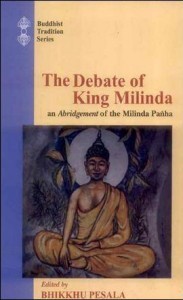 The Debate of King Milinda – The Milinda Pañha is a famous work of early Buddhist literature, probably compiled in the first century B.C. It presents the core Buddhist doctrines in an attractive and memorable form as a dialogue between a Bactrian Greek king, Milinda, who plays the ‘Devil’s Advocate’ and a Buddhist sage, Nagasena.
The Debate of King Milinda – The Milinda Pañha is a famous work of early Buddhist literature, probably compiled in the first century B.C. It presents the core Buddhist doctrines in an attractive and memorable form as a dialogue between a Bactrian Greek king, Milinda, who plays the ‘Devil’s Advocate’ and a Buddhist sage, Nagasena.
Download the free pdf ebook here:
 The Debate of King Milinda
The Debate of King Milinda
Who was King Milinda?
King Milinda, known also as Menander I, holds a position of note in the annals of history, particularly within the context of the Indian subcontinent during the 2nd century BCE. His reign comes at a time when the regions of present-day Afghanistan, Pakistan, and northern India were under the influence of Hellenistic civilization, a legacy of Alexander the Great’s conquests. Among the Indo-Greek monarchs, King Milinda stands out, not only for his substantial territorial reign but also for his profound engagement with Buddhism, a significant religious tradition in his realm.
Menander I’s reign was marked by territorial expansions, and his leadership brought about a period of prosperity which in turn nurtured a unique cultural synthesis, now referred to as Greco-Buddhist art. This cultural blend was emblematic of a deeper interaction between the Greek and Buddhist traditions, and King Milinda himself became a key figure in this cross-cultural exchange.
The most enduring legacy of King Milinda’s interaction with Buddhism is encapsulated in the ancient text, “Milinda Panha” or “The Questions of King Milinda.” This text records a series of dialogues between King Milinda and the Buddhist sage Nagasena. These weren’t merely casual conversations but profound philosophical and doctrinal explorations. Through these dialogues, King Milinda posed challenging questions about Buddhism, thereby delving into the core teachings of this ancient tradition. It was through this exchange that the intellectual rigor of Buddhist thought was articulated, juxtaposed against the Hellenistic philosophical traditions that King Milinda represented.
The legacy of King Milinda extends beyond his reign and his philosophical inquiries. He left an indelible mark on the cultural and spiritual landscape of the region. His dialogues with Nagasena not only symbolize the rich intercultural dialogues of that era but also contribute to our understanding of the intellectual traditions of the ancient world. Through King Milinda’s engagement with Buddhism, a unique chapter in the historical interplay between Hellenistic and Buddhist thought was crafted, offering a rich tapestry of cultural and philosophical heritage.


I am studing on bhikhu nagsena king of milinda pl help any material
Thinks!
I am interersted study about this topic on
bhikhu nagsen and king of milinda If have any material Pl healp me!